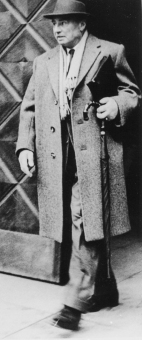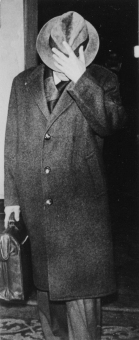The Second Frankfurt Auschwitz Trial (1965–1966)

in the 2nd Frankfurt Auschwitz Trial,
1965/66
© Fritz Bauer Institute

in the 2nd Frankfurt Auschwitz Trial,
1965/66
© Fritz Bauer Institute
The public prosecutor’s office of the Landgericht (regional court) in Frankfurt am Main launched a second preliminary investigation of Auschwitz criminals in 1961, following the first one that began in mid-1959 and changed into the first Frankfurt Auschwitz Trial (1963–1965). The plan was to conduct another big Auschwitz trial, but the proposal could not be implemented. The substantial amount of time elapsed since the events made it increasingly difficult for the investigators to obtain evidence.
Two members of the SS at Auschwitz whom the law enforcement body had sought to include in the first Auschwitz trial, in addition to a defendant who was eliminated from the first trial because of illness, were brought before the court in the second Auschwitz Trial.
The accused were the previous head of the administrative department, Wilhelm Burger, a former member of the Political Department, Josef Erber, and Gerhard Neubert, who had been a medical orderly in the prisoner infirmary of the Buna/Monowitz concentration camp. Action against Neubert in the first Auschwitz Trial had been curtailed because of his illness. The “criminal case against Burger et al., 4 Ks 3/63” was tried from December 1965 to September 1966, with the court in session for 63 days. The Frankfurt jury court found Burger guilty of having procured the poison gas Zyklon B as a means of murder. With regard to intent, the criminal court judges deemed him—despite his central function as a department head and higher-ranking SS leader— merely an accessory and sentenced him to eight years of imprisonment. The defendant Erber, however, qualified as a coperpetrator in the court’s eyes. He was found guilty of having participated in ramp and camp selections and in the murder of members of the rebellious special unit on October 7, 1944. Here, the court ruled, Erber acted in concert with the main criminals Hitler, Himmler, and others. As a murderer, he was sentenced to life imprisonment.
Neubert, like Burger, was considered an accessory by the court. His participation in selections in the prisoner infirmary (HKB; Häftlingskrankenbau) of the Buna/Monowitz concentration camp resulted from the order of a superior. The SS doctor usually decreed a preliminary selection in the HKB, which Neubert, often in the company of an inmate physician, had to conduct. The so-called preselections then were checked and either confirmed or overturned by the SS doctor on duty. In the opinion of the court, however, the accused had also made final decisions in the absence of the camp physician. But because he had acted exclusively in obedience to orders, that is, he could not be found to have acted on his own initiative, his involvement in the killing of prisoners was evaluated as aiding and abetting. As an accessory to collaborative murder, Neubert was sentenced to three and one-half years of imprisonment.
The second Frankfurt Auschwitz Trial aroused less interest among the public and in the media than the “criminal case against Mulka et al.” Its prehistory and its outcome indicated that proof of the individual guilt of Auschwitz defendants was becoming increasingly difficult, despite the extensive factual knowledge acquired by investigators in the public prosecutor’s office in Frankfurt am Main. Two reasons stand out from others here. Witnesses on several occasions were no longer willing to make the journey to the venue in Frankfurt. The outrageous way of dealing with victims who were witnesses at the trials, the frequently light sentences in which the trials culminated, and reasons of health prevented survivors from shouldering the burden of bearing witness and appearing in court. The oral evidence, on which the jury courts usually had to rely in unraveling the intricate complex of Auschwitz crimes, proved less and less reliable with the passing of time since the events. Witnesses had given inconsistent statements over the course of several examinations. In the main trial, they no longer could recall with certainty facts that they had reported with great conviction in prior examinations, often conducted many years previously.
(WR; transl. KL)
















